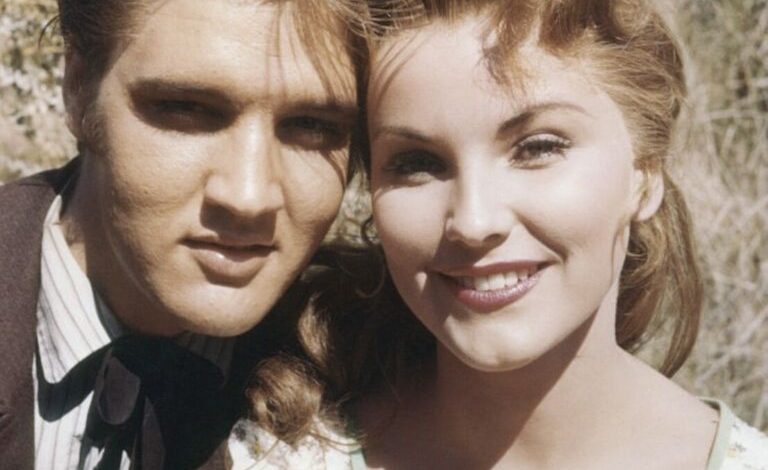
Everybody loved Elvis Presley in this movie – but few noticed the weird detail about his hair
Elvis Presley’s first movie, Love Me Tender, may be available on YouTube for free now, but when it was released in 1956, it was nothing short of a cultural explosion. For longtime fans, revisiting this cinematic gem is a chance to witness the magic of a young Elvis stepping into the world of film. And for those discovering it for the first time, it’s an extraordinary peek into the moment when the King of Rock ‘n’ Roll made his transition from music icon to movie star.
Elvis wasn’t simply a performer with a golden voice—he was a born entertainer. Love Me Tender proved that he was more than a chart-topping singer with wild stage moves. It revealed his potential as an actor, showcasing his natural screen presence, emotional depth, and dedication to the craft. At just 21 years old, he delivered a performance that resonated with audiences far beyond what anyone had expected from a debuting musician-turned-actor.
The film was originally titled The Reno Brothers and was intended to be a modest Civil War-era Western focusing on love, betrayal, and family conflict. But once Elvis was cast, producers made a pivotal decision—to rename the movie after the ballad he would sing in the film. That change was strategic and brilliant. The song “Love Me Tender” became a runaway hit even before the film’s release, helping to propel anticipation and ticket sales to unprecedented levels. RCA received over one million advance orders for the record, earning it gold status before it hit shelves.
When the film premiered at the Paramount Theater in New York City, the scene was pure mayhem. More than 1,500 fans camped out overnight beneath a massive 40-foot cutout of Elvis’s face. Inside, audiences erupted in deafening screams every time Elvis appeared on screen. Some of his lines were completely drowned out by the fan frenzy. It wasn’t just a movie—it was a seismic moment in American pop culture.
In the film, Elvis portrayed Clint Reno, the youngest of four brothers caught in a tangle of loyalty, love, and betrayal. It remains the only time he ever played a character based on a real historical figure—loosely inspired by members of the infamous Reno Gang, among America’s first known train robbers. Though he was billed third behind established stars Richard Egan and Debra Paget, Elvis threw himself into the role. He learned not only his own lines but also those of his co-stars, determined to prove himself as more than a heartthrob singer.
Behind the scenes, Elvis was humble and hardworking. Debra Paget later described him as sweet, respectful, and deeply sincere. He had grown up admiring actors like Marlon Brando and James Dean while working as an usher in a Memphis theater. He dreamed of being taken seriously as an actor, not just a celebrity. Yet, his manager, Colonel Tom Parker, had a different vision—one in which each movie served primarily to promote Elvis’s music. As a result, songs were often added to his films to showcase his voice and keep fans satisfied.
Initially, Elvis wasn’t even meant to sing in Love Me Tender, but that changed quickly. His musical numbers became some of the most memorable scenes in the film, even if they weren’t exactly historically accurate. After all, screaming teenage girls don’t usually show up in Civil War-era Westerns. But in the world of Elvis, it worked.
The title song, “Love Me Tender,” was adapted from a Civil War ballad called “Aura Lee.” New lyrics were written by Ken Darby, though he credited them to his wife, Vera Matson. Elvis’s televised performance of the song on The Ed Sullivan Show before the film’s release helped cement its place in history.
The connection between Elvis and Debra Paget went beyond the screen. He was reportedly smitten with her, even asking for her hand in marriage—an offer she gently declined due to parental objections and her own growing relationship with Howard Hughes. Still, her influence lingered. It’s believed that Priscilla Presley later mimicked Debra’s iconic hairstyle from the film, hoping to capture Elvis’s attention by echoing someone he had admired.
One of the more emotional behind-the-scenes facts involves Elvis’s mother, Gladys. She was heartbroken by the film’s original ending, in which Clint Reno dies. Moved by her reaction, the producers added a final scene: a soft, silhouetted performance of “Love Me Tender” over the credits, allowing Elvis to “live on” in the hearts of his fans. However, this last-minute addition led to a continuity error—Elvis had dyed his hair jet black by then, making it noticeably different from the earlier scenes where his natural brown hair appeared.
Eagle-eyed viewers will also spot other amusing anachronisms throughout the movie. A background car from the 1950s appears in one shot, zippers are used on costumes despite not being invented during the Civil War era, and a guitar strums magically even after Elvis stops playing. In one scene, a gun vanishes and reappears between cuts. These little quirks, while unintentional, have become part of the film’s charm for modern audiences.
Despite these oddities, Love Me Tender remains a milestone—not just in Elvis’s career, but in the history of American entertainment. It marked the beginning of a prolific film run for the King, who went on to star in over 30 movies. While not every film he made was a critical success, each was infused with his unmistakable charisma and heart.
Love Me Tender is a story about love, loyalty, and sacrifice. But more than that, it’s the story of a young man taking his first bold steps into a new world. Elvis may have already conquered music, but with this film, he showed the world that he could command the screen with just as much force.
You can still watch Love Me Tender for free online and relive the film that started it all. As you enjoy the music, the story, and yes, even the bloopers, remember that this was where Elvis’s Hollywood journey began—with ambition in his eyes, music in his heart, and an army of fans already waiting for him to make history.
So share the story, share the film, and share the memory of a legend who never stopped chasing his dreams—even when the spotlight was brand new.




